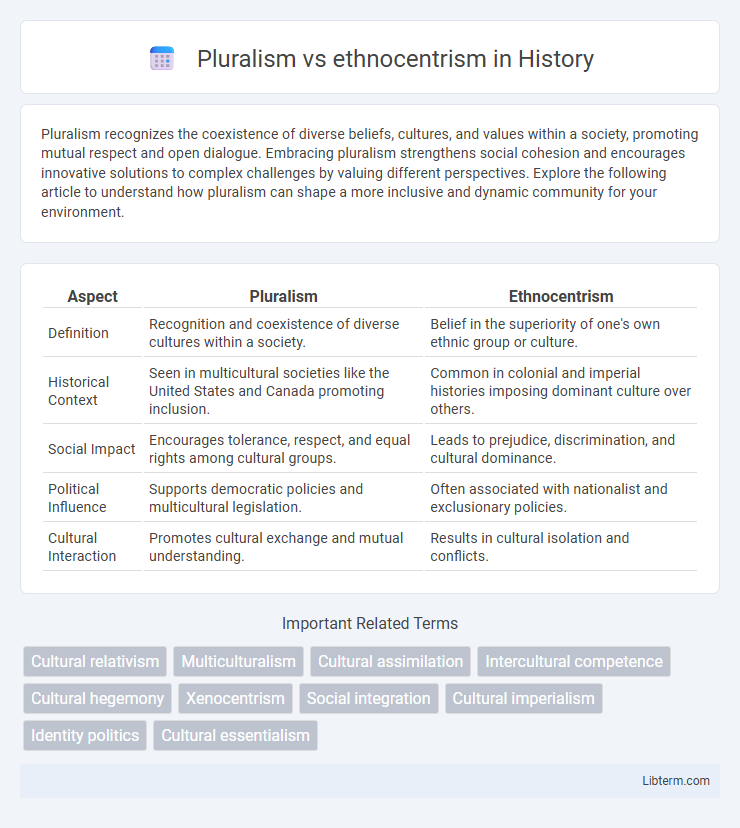Pluralism recognizes the coexistence of diverse beliefs, cultures, and values within a society, promoting mutual respect and open dialogue. Embracing pluralism strengthens social cohesion and encourages innovative solutions to complex challenges by valuing different perspectives. Explore the following article to understand how pluralism can shape a more inclusive and dynamic community for your environment.
Table of Comparison
| Aspect | Pluralism | Ethnocentrism |
|---|---|---|
| Definition | Recognition and coexistence of diverse cultures within a society. | Belief in the superiority of one's own ethnic group or culture. |
| Historical Context | Seen in multicultural societies like the United States and Canada promoting inclusion. | Common in colonial and imperial histories imposing dominant culture over others. |
| Social Impact | Encourages tolerance, respect, and equal rights among cultural groups. | Leads to prejudice, discrimination, and cultural dominance. |
| Political Influence | Supports democratic policies and multicultural legislation. | Often associated with nationalist and exclusionary policies. |
| Cultural Interaction | Promotes cultural exchange and mutual understanding. | Results in cultural isolation and conflicts. |
Introduction to Pluralism and Ethnocentrism
Pluralism recognizes the coexistence of diverse cultural, ethnic, and social groups within a society, promoting mutual respect and understanding among different identities. Ethnocentrism, by contrast, involves evaluating other cultures based on the standards and values of one's own group, often leading to prejudice and cultural superiority. Understanding these concepts is essential for fostering inclusive communities and addressing social conflicts rooted in cultural differences.
Defining Pluralism: Embracing Diversity
Pluralism emphasizes valuing diverse cultural, ethnic, and social groups within a society, fostering mutual respect and inclusion. It promotes coexistence where multiple identities and perspectives contribute to a dynamic and enriched community. This approach directly opposes ethnocentrism, which judges other cultures based on one's own cultural standards, often leading to bias and discrimination.
Understanding Ethnocentrism: A Narrow Worldview
Ethnocentrism is a narrow worldview that judges other cultures solely by the values and standards of one's own cultural group, often leading to misunderstanding and bias. This perspective limits the ability to appreciate cultural diversity and impedes social cohesion in multicultural societies. Recognizing ethnocentrism is essential to fostering pluralism, which promotes respect for multiple cultural identities and encourages inclusive interactions.
Key Differences Between Pluralism and Ethnocentrism
Pluralism emphasizes the coexistence and mutual respect of diverse cultural groups within a society, promoting equal value and inclusion of different identities. Ethnocentrism involves evaluating other cultures based on the standards and values of one's own culture, often leading to bias and prejudice. The key difference lies in pluralism's acceptance and celebration of diversity versus ethnocentrism's tendency to prioritize one culture as superior.
Historical Roots of Pluralism and Ethnocentrism
The historical roots of pluralism can be traced to the Enlightenment era, promoting acceptance of diverse cultural, religious, and social groups within society to foster coexistence and mutual respect. Ethnocentrism, by contrast, has origins in early tribal and colonial societies where groups viewed their own culture as superior, often justifying domination and exclusion of others. These contrasting foundations highlight pluralism's emphasis on inclusivity versus ethnocentrism's focus on cultural hierarchy and uniformity.
The Social Impacts of Pluralistic Societies
Pluralistic societies promote social cohesion by encouraging respect for cultural diversity and reducing ethnic conflicts through inclusive policies and multicultural education. This environment supports greater innovation and economic growth by integrating diverse perspectives and talents from various ethnic groups. However, the success of pluralism depends on equitable resource distribution and active efforts to combat underlying ethnocentrism that may lead to social fragmentation.
Consequences of Ethnocentrism on Communities
Ethnocentrism fosters social division by promoting in-group superiority and out-group discrimination, leading to prejudice and conflict within multicultural communities. It inhibits intercultural communication and cooperation, resulting in social fragmentation and reduced community cohesion. Persistent ethnocentric attitudes can escalate tensions, marginalize minority groups, and undermine social harmony and economic development.
Pluralism in Modern Multicultural Societies
Pluralism in modern multicultural societies fosters coexistence by valuing diverse cultural identities and promoting equal respect for different ethnic groups. It encourages social integration through policies that support cultural expression, mutual understanding, and collaboration across communities. This approach contrasts with ethnocentrism by emphasizing inclusivity and the appreciation of cultural pluralism as essential for social cohesion and democratic stability.
Challenges and Criticisms Facing Pluralism
Pluralism faces challenges such as social fragmentation and the difficulty of maintaining a cohesive national identity amid diverse cultural groups. Critics argue that pluralism may inadvertently promote segregation or inhibit effective communication between communities by emphasizing differences over commonalities. Ethnocentrism contrasts with pluralism by prioritizing a single cultural framework, often leading to prejudice and resistance against multicultural integration.
Promoting Pluralism: Moving Beyond Ethnocentrism
Promoting pluralism involves recognizing and valuing diverse cultural perspectives while actively challenging ethnocentrism, which centers one's own culture as superior. Emphasizing cultural relativism fosters mutual respect and inclusion, enabling societies to thrive through intercultural dialogue and cooperation. Education that highlights multicultural understanding serves as a crucial tool in moving beyond ethnocentric biases toward embracing pluralistic principles.
Pluralism Infographic

 libterm.com
libterm.com